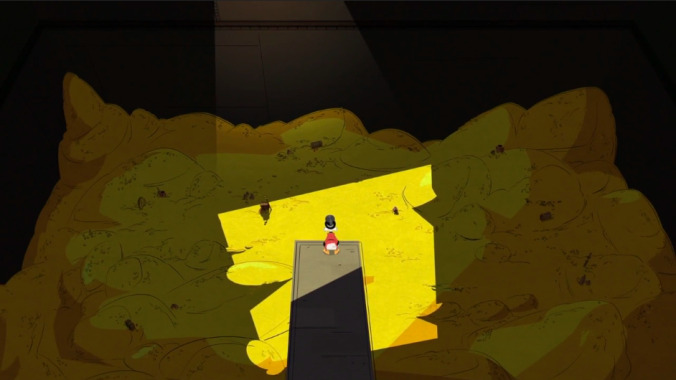“The 87 Cent Solution!” is a showcase for Scrooge McDuck, for David Tennant, as he slowly descends into a disturbing, dangerous madness. An already sick Scrooge visits the money bin to deal with a once-a-year charity event with his rival, Glomgold, but when he dives into his money to refresh himself, he notices that some of the money is missing. When questioned by his nephews, he tells them that he’s missing a whopping eighty-seven cents. Of course, there’s nothing wrong with Scrooge freaking out over missing chump change. That’s been his M.O. since forever. The problem is that he’s sick, so some of the nephews aren’t sure if he’s even right, and as he gets worse, he begins to act more and more unhinged. It’s funny at first, with his increased, ridiculous security and behavior inciting a few laughs (the tears over his counts, followed by a two million dollar bounty was a funny scene). But the moment that he literally risks Dewey’s life by mistaking him for a thief, it’s no longer funny.
The shift in the tension of that scene insures that things are taken seriously from that point on; even Webby, the sole supporter of Scrooge’s belief, eventually comes around to realizing that something is very wrong. Tennant, in conjunction with the animators, really work to showcase how dangerous Scrooge comes off, with those rants growing more vicious and biting, with his red eyes and ruffled feathers changing from visual gag to almost-horror villain. He swings in the money bin displaying his theory-filled corkboard like a madman, and even physically fights off everyone trying to hold him back from diving into the bin. It’s a legit tense watch, especially if we believe the “never-wrong” Junior Woodchuck Guidebook, that this “gold fever” is truly fatal. That Scrooge is will to die for this is insane, but feels a part of his character. His absolutely affinity for his money is well-known, but his willingness to dig his heels and commit to his presumptions, refusing to need anyone, is also well-established in this iteration.
It’s the small touches that sell this episode, like the multiple, potential suspects (Magica is name-dropped, and even Owlson comes off a bit too down-to-earth, suggesting that her calm acceptance of Scrooge’s financial losses are maybe part of some plan of hers, which also says something about us–why do we just expect every character to be slightly off in some way?). There’s also just the question of whether Scrooge is right, since we’ve know him to be very knowledgeable about his money, and we known him to be a bit flippant when it comes to the safety and well-being of his family. But he could also be wrong, what with the actually behaviors (boxes on his feet, his clothes being too small, the imaginary “Chester”) coming off legit disturbing. Come to find out, it’s a bit of both. The mastermind this is Glomgold, the person you both most expect and least expect. After bursting into Scrooge’s funeral (he faked his death) tossing money around to a rap song (a darkly funny bit), Huey prods at his pride with a dismissive eulogy, prompting him to rant about how he did it. There’s a lot of conveniences here, particularly with the Time Teaser falling at his feet randomly, but after a 12-month baby-staring content, Glomgold unleashes a disturbing series of minor conveniences and pranks to make the richest duck in the world go crazy. Scrooge dismisses Glomgold latest scheme as no big deal, but it’s good, narratively speaking, that Glomgold now feels like a real threat for the future.
The only thing that hurts this episode is that the moment where Scrooge realizes that he’s gone too far is never given much weight or time to click. He pushes away his family and stares at his valley of gold, then kind of us realizes that, yeah, he’s going overboard. So when he confronts Glomgold and tells him that his family keeps him grounded, it’s not as effective as it should be. The visual image of Scrooge surrounded by his family does the heavy lifting of that beat. Scrooge needing his family to keep him from going too far within his own head when it comes to his riches has been a low-key, nuanced characteristic since his comic days, and seeing it reinforced here gives “The 87 Cent Solution!” a solid ending to this group of familial characters, before we shoot back off to space to revisit Della Duck tomorrow.
Stray observations
- “The 87 Cent Solution” combines two story lines from the original show. The “gold-fever” stuff comes from the “Treasure of the Golden Sun” five-part premiere (I’d love the show to try their take on “El Capitán,” a disturbing villain in his own right and a good example of what Scrooge almost ends up as). The Time Teaser comes from “Time Teasers,” in which the Beagle Boys get their hands on Gyro’s device and rob Scrooge’s bin.
- Another smaller reference is when Gyro’s security system shocks Donald when he walks through the electric wall, a scene from the original show involving Scrooge but also in the theme song. Can’t quite remember which episode it’s from.
- I know I missed way, way more, but can’t place them all. Do you due diligence, commenters!
- (I would say the references work better her than in season one because they add to the rhythms and forward momentum of the story versus feeling like they’re there for the sake of being there.)
- The nephews strictly coming together after Dewey nearly was hurt, even visually, was a very good touch. The nephews work way better as a group than separate, and the show is realizing this.



 Keep scrolling for more great stories from The A.V. Club.
Keep scrolling for more great stories from The A.V. Club.